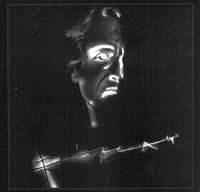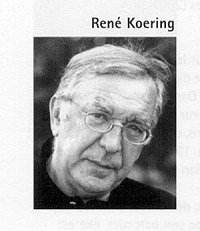Xenakis Khoai, Mists, Nomos Alpha and Zyia
with François-Bernard Mache Guntur madu
(1990) Chamber Music at Palais de Rhin
Xenakis Jonchaies & Keqrops Rene Koering
Aigaion - in memoriam Iannis Xenakis Pascal Dusapin
Extenso, solo no.2 Orchestre National de Montpellier/Languedoc-Roussillon/Pascal
Rophe/Louise Bessette (piano) at Palais des Fêtes (PGW)

IANNIS XENAKIS -
(photo Marthe Lemelle ]
A day in honour of Xenakis, who died earlier in the year and had a special
association with the city through his works composed for the pioneering
Percussions de Strasbourg, began with a showing of Mark Kidel's wide
ranging TV film Something Rich and Strange, followed by a chamber
music concert, with the established classics for solo harpsichord, piano
& cello, Khoai, Mists and Nomos Alpha, together
with lesser known pieces. Zyia (1952) for voice, clarinet &
piano, which draws on his Greek folk music and anticipates many of the
formal preoccupations in his influential oeuvre, was a discovery
for most of us, containing the seeds of many of Xenakis' innovations,
quite apart from being an attractive concert piece in its own right.
Also included was Guntur madu (1990) by François-Bernard
Mache, a composer too little known in UK, who also contributed one
of the tributes to Xenakis in the collectable programme book. This is
one of the many important contribution to the modern harpsichord repertoire
composed for Elisabeth Chojnacka, who dazzled us in it as in her account
of Khoai, which she premiered a quarter century ago and has recorded
on a very desirable CD, [ERATO 2292-45030-2].
This important retrospective of Xenakis's solo and
chamber music was, however, but an upbeat to a unique orchestral concert,
possibly the loudest ever!

The Orchestre National of Montpellier, delayed by an air strike,
arrived to unleash a cannonade of music by Xenakis and, to begin, one
totally over-the-top, written for him posthumously. The percussionist
wisely wore ear protectors for Rene Koering's Aigaion - in
memoriam Iannis Xennakis (2001), which must have broken all decibel
records for Strasbourg's staid Palais des Fetes. Its charming dedication
explained the hectic sustained fast tempoof this tribute was deliberately
conceived as the antithesis of such conventional funeral music as might
'make the stones of the Parthenon weep', and he hoped Xenakis would
have preferred it thus. Rene Koering (b.1940) studied with Boulez &
Maderna, is music director of Radio France and of the Montpellier orchestra.
He is another of those many composers unknown in UK and it would be
appropriate for the BBC to invite this impressive orchestra to the Proms;
Aigaion would enthrall a Royal Albert Hall audience.
Xenakis' piano concerto Keqrops (1986) coming
next was disappointing; the piano part was surprisingly uninteresting
when Louise Bessette was playing alone and inaudible against the orchestra;
the two seemed unrelated. Dusapin's Extenso, solo no.2
(1994) fitted well into the programme, its unison beginning offering
some contrast of texture. It then explored the tritone, growing to a
huge climax 'with harmonic expansion doubled by that of rhythm' - an
interesting, disturbing work, worth hearing again.
Lastly was Jonchaies (1977), one of Xenakis'
largest and most sonorous creations, commissioned by Radio France. This
is a work of maximum energy and intensity, so complex in its multiplicity
of textures and rhythms that 'a rational approach would render most
of the score practically unplayable'! Without a score - which I would
probably have found impossible to follow - I was intrigued by the transitions
and dislocations between some sections and found the whole thing greatly
exhilarating, and the programme as a whole a tremendous achievement
for this formidable orchestra from Languedoc-Roussillon. Jonchaies,
too, would make a sensation at the Proms.
Peter Grahame Woolf


 Return to:
Music on the Web
Return to:
Music on the Web